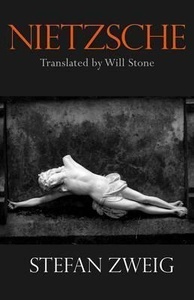Nietzsche

Editorial Hesperus
Fecha de edición abril 2013 · Edición nº 1
Idioma inglés
EAN 9781843913832
122 páginas
Libro
encuadernado en tapa blanda
Dimensiones 10 mm x 195 mm
Resumen del libro
This brilliant, newly translated edition of Nietzsche displays Zweig's particular forte for creatively mapping the psychology of his subject and their historical significance. It is the compelling third part of Stefan Zweig's much overlooked 'Master Builders of the Spirit' series, entitled 'The Struggle with the Demon'. Zweig eschews traditional academic discussion and focuses on Nietzsche's habits, passions and obsessions.
This work, concentrating on the man rather than the work, on the tragedy of his existence and his apartness from the world in which he moved in enforced isolation, is a brief tour de force and essential reading for anyone interested in Zweig or Nietzsche. One is drawn inexorably into Nietzsche's tragic trajectory. Illustrated with stunning new photographs relating to Nietzsche and his European locations, this superb translation by Will Stone is essential reading for anyone interested in Nietzsche, Zweig, first-class biographies and philosophy.
Biografía del autor
Stefan Zweig es un bio grafo peculiar. Escoge personajes poco probables, figuras extremas, movidas por obsesiones y lacerantes contradicciones internas. Personajes que, como Fouche o Magallanes, se encuentran envueltos en momentos cruciales, cuyas decisiones desencadenan, de una forma u otra, consecuencias imprevisibles con repercusiones enormes. Tambie n la de otros, como von Kleist o Nietzsche, en cuya hondura, soledad y melancoli a parece que retrata Zweig la suya propia. En el caso de Nietzsche, el retrato de los tormentos del genio, el sentido moral con el que mira a la verdad, captan parte del drama interno del autor y del que este percibe en el destino de la Europa de posguerra que tiene ante si .








